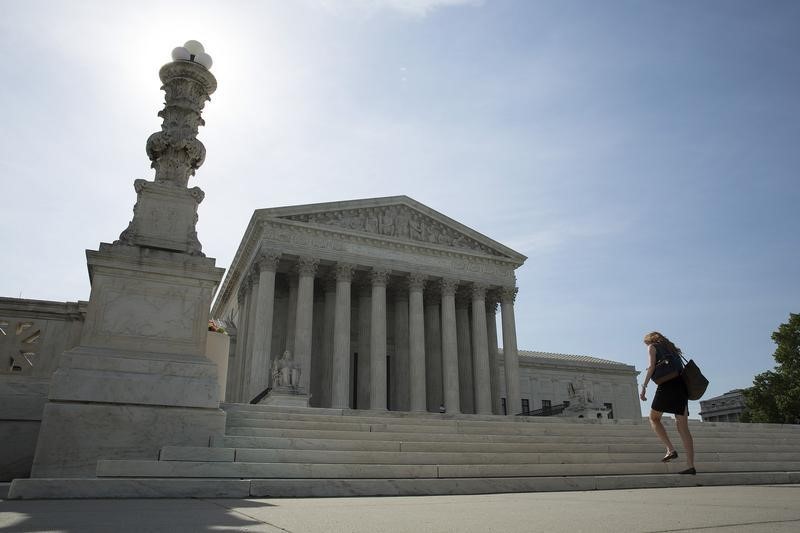By Lawrence Hurley
WASHINGTON (Reuters) - The U.S. Supreme Court on Tuesday appeared hesitant to let states force out-of-state online retailers to collect sales taxes on purchases, with some of the justices saying Congress would be best suited to resolve the matter.
The nine justices heard a one-hour argument in the closely watched case pitting South Dakota, backed by President Donald Trump's administration, against e-commerce businesses, a fight potentially worth billions of dollars that could affect states' coffers and consumers' wallets.
The justices heard the case against a backdrop of Trump's criticism of Amazon.com Inc (O:AMZN), the dominant player in online retail, on the issue of taxes and other matters.
South Dakota asked the justices to overturn a 1992 Supreme Court precedent that states cannot require retailers to collect state sales taxes unless the businesses have a "physical presence" in the state. Out-of-state online retailers Wayfair Inc (N:W), Overstock.com Inc (O:OSTK) and Newegg Inc are contesting South Dakota's authority to collect the taxes, and won in the lower courts.
Some of the justices appeared to agree with the companies that a ruling striking down that precedent in a case called Quill Corp v. North Dakota would lead to a scramble among states to pass their own laws that could impose varying burdens on small businesses.
"Congress is capable of crafting compromises and trying to figure out how to balance the wide range of interests involved here," Justice Elena Kagan said.
Along similar lines, Justice Sonia Sotomayor said the questions raised in the case are "wrought with difficulties."
It remained unclear how the court will rule. Some members of the court, including the often-pivotal Justice Anthony Kennedy and Trump's appointee Neil Gorsuch, appeared sympathetic to South Dakota.
'PARTICULAR BUSINESS MODEL'
"Why should this court favor a particular business model?" Gorsuch asked, in reference to e-commerce companies that do not collect taxes.
Kennedy said the 1992 decision has been "proven incorrect" and indicated it is the court's responsibility to overturn it rather than waiting for Congress to act. Justice Ruth Bader Ginsburg made a similar point, saying that it was not Congress' job "to overturn our obsolete precedent."
But Chief Justice John Roberts cited court filings saying the problem South Dakota is seeking to resolve may be lessening because many of the biggest online retailers, like Amazon, now collect state sales taxes.
"And if it is, in fact, a problem that is diminishing rather than expanding, why doesn't that suggest that there (is) greater significance to the arguments that we should leave Quill in place?" Roberts asked.
Justice Samuel Alito said a ruling favoring South Dakota could embolden states "tottering on the edge of insolvency" to seek to collect as much sales tax as possible by targeting out-of-state businesses.
A ruling favoring South Dakota could eventually lead to online customers paying more for many purchases. Such a ruling could help small brick-and-mortar retailers compete with online rivals while delivering up to $18 billion in tax revenue to the affected states, according to a 2017 federal report. The justices are due to decide the case by the end of June.
South Dakota depends more than most states on sales taxes because it is one of nine that do not have a state income tax. South Dakota projects its revenue losses because of online sales that do not collect state taxes at around $50 million annually.
Amazon, which is not involved in the Supreme Court case, collects sales taxes on direct purchases on its site but does not generally collect taxes for items sold on its platform by third-party venders, amounting to about half of total sales. Two states recently enacted laws requiring such collections.
Trump has assailed Amazon CEO Jeff Bezos, who owns the Washington Post, a newspaper that the Republican president also has disparaged.
South Dakota is supported by industry groups representing major retailers that have brick-and-mortar stores that already collect state sales taxes. The National Retail Federation, which supports the state, has a membership that includes Walmart Inc (N:WMT), Target Corp (N:TGT) and Amazon.
E-commerce companies supporting Wayfair, Overstock and Newegg include two that provide online platforms for individuals to sell online: eBay Inc (O:EBAY) and Etsy Inc (O:ETSY).

The 2016 South Dakota law requires out-of-state online retailers to collect sales tax if they clear $100,000 in sales or 200 separate transactions. The state sued a group of online retailers to force them to collect the sales taxes, with the aim of overturning the 1992 precedent.
